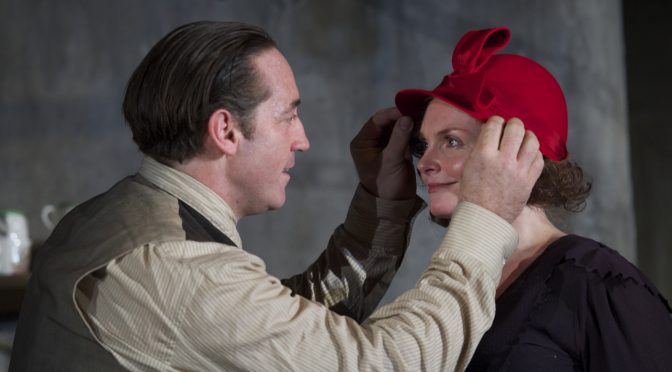Josie Rourke, renowned for her work at the Bush Theatre, is canny in her choice of play to mark her directorial debut at the National. Ena Lamont Stewart’s Men Should Weep is a social drama with a large cast enacted on an intimate level. Rourke uses her experience of small venues while exploiting the Lyttelton’s resources to create the play’s larger world. Her skill envelops the audience; her talent is a fresh approach for the National Theatre.
Bunny Christie’s magnificent set reflects the claustrophobic squalor of the 1930s tenement in which the play is set. It’s impressive, but Rourke is never distracted by it. Lamont Stewart’s slice of life story receives the respect it deserves. The playwright worked in the Glasgow library and hospital during the depression and her text has an authentic feel that is captivating. The language maybe daunting, but might only prove a problem for the truest blooded Sassenach.
Men Should Weep is full of great roles for women. Sharon Small plays Maggie Morrison the matriarch of the family, around whom the story revolves. It is a demanding role performed with aplomb. Jayne McKenna is wonderful as her sister, a brittle, regretful woman. The younger generation fight against their poverty any way they can, with excellent performances from Sarah MacRae and Morven Christie. Thérèse Bradley puts in a great turn as the miserly sister-in-law, “so hard they dug her from a quarry”. These are women not to be messed with, but the mess their lives are in makes you understand why.
What of the men who should be weeping? Robert Cavanah plays John Morrison. The character’s faults make him a difficult man to sympathise with but love of his family and intelligence are always behind Cavanah’s performance. John says that poverty bends a man over double and makes him like “a human question mark”.
It’s grim up north to be sure, but the play is masterfully free of clichés and histrionics. Laughter and love of the family shine forth but without a ‘salt of the earth’ touch. There are no angels or devils here – just difficult circumstances. The domestic violence and vice can be harsh and shocking, but the motivation is desperation, and humour is never far behind. The Morrison children certainly suffer, but these are the sorts of lives the Jeremy Hunts of the world should consider before proscribing how many children people should have. Our current recession differs in many ways from that Lamont Stewart experienced, but her insight into human dignity has important lessons for us all.
Until 9 January 2010
Photo by Manuel Harlan
Written 27 October 2010

